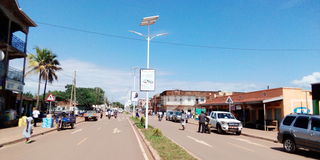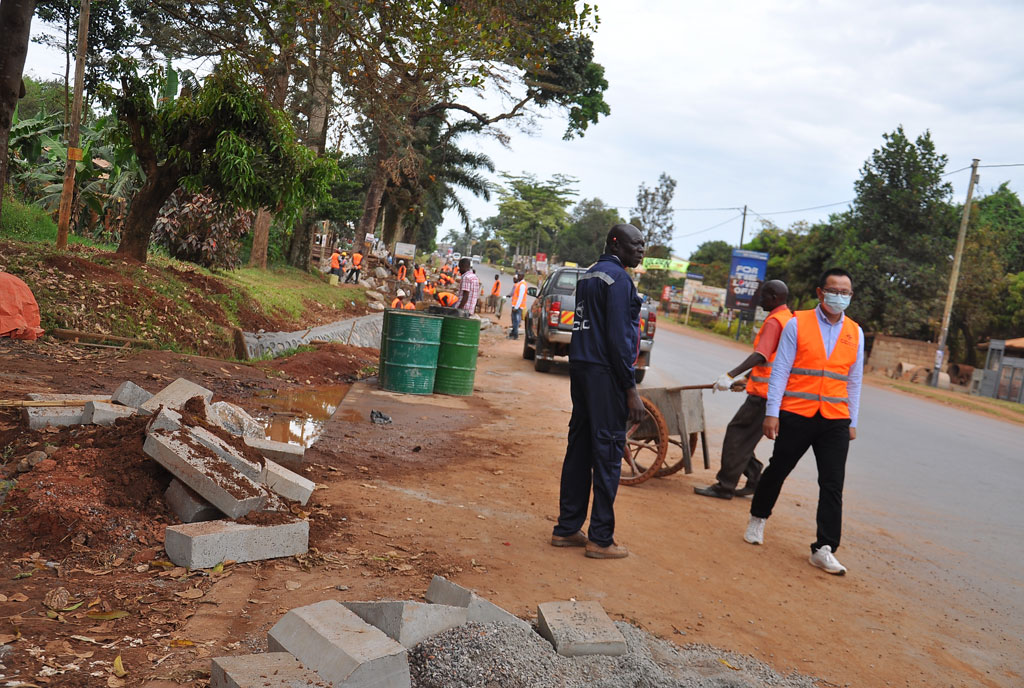How neglect is failing street lighting in cities

Some of the solar lights in Gulu City. The lights were installed under the Uganda Support to Municipal Infrastructure Development (USMID) project funded by the World Bank. PHOTO/ MARTIN OKUDI
What you need to know:
- The lights had helped to reduce crime, improve road safety as well as support the night economy.
Several municipalities and new cities have in the last decade received infrastructural projects, which have seen improvement in street lighting.
This publication has, however, established that the installed street lighting system in most urban centres has broken down due to lack of a clear maintenance programme.
Some of the solar street lights became faulty just months after being installed while others have been vandalised.
The lights were installed under the Uganda Support to Municipal Infrastructure Development (USMID) project funded by the World Bank and had helped to reduce crime rates, improved road safety as well as supporting the night economy.
In Masaka City, most of the solar lamps were installed between 2015 and 2018 and each, according to city authorities, cost Sh12m, with a 10 year- warranty.
However, some lamps are currently non-functional.
On Yellow Knife Road, one of the streets, which first received solar powered street lights in 2015, four of the 10 lights are no longer working.
Of the 23 solar lamps on Edward Avenue, four are faulty, including one near Masaka City hall.
City residents say the rate at which the solar lights are breaking down may plunge the new city into darkness.
According to Mr Musa Kabitto, a resident of Baata Cell, some solar lights just went off suddenly while others were knocked by drunken motorists.
“We are wondering why city authorities are not considering repairing or servicing the faulty lights. At this rate, we may not have street solar lamps in the coming few months,” Mr Kabitto says.
This publication has established that some of the batteries that power the solar panels have also been stolen.
Mr Solomon Mubiru, a businessman in Masaka City, says the solar lights had saved them from thugs who used to hide in the dim places to rob unsuspecting residents.
Insecurity fears
“With more solar lamps becoming faulty by the day, we are likely to experience problems which had become history .We ask the mayor and her team to fix the faulty lamps so that we can have a brightly lit city,” he says.
Ms Florence Namayanja, the mayor of Masaka City, says despite their meagre resources, plans are underway to repair the faulty lamps.
“We are not seated, we are looking for funds to repair the non-functional lamps. Currently, we are also installing solar lights in all trading centres annexed to the city, which never had street lights before,” she says.
In Kabale Town, the authorities say the street solar system proved inefficient due to absence of enough sunlight to charge the batteries.
According to Mr Felix Beinamaryo, the Uganda National Roads Authority (Unra) area station manager, says they replaced the solar lamps last July with those powered by hydropower. “After changing the lighting system in Kabale Town, similar connections will be done at Bunagana Border Post in Kisoro District and Katuna Border Post in Kabale District,” he says.
The mayor of Kabale Town, Mr Byamugisha Sentaro, says the solar system had proved expensive in terms of maintenance since they were required to replace the exhausted batteries after some months.
“The solar lamps were installed in 2016, but a few years later the system failed to operate normally and the streets were left in darkness. I was forced to petition the government to replace them. They have so far re-connected hydro-electricity on Kabale High Street. Other roads such as Nyerere Road, Nyerere Avenue, Kigongi Road and Post office-Makanga Road will also be replaced with hydro power soon,” he says.
Jinja City authorities say they lack funds for the maintenance of the solar security lights.
“The works department is aware of all the problems surrounding the solar lights but there is no budget allocated for the maintenance of those lamps. Just replacing one solar security lamp with the pole costs between Shs8m and 10m,” Mr Rajab Kito, the Jinja City public relations officer, says.
On Nalufenya-Clive Road, which was commissioned in 2016, about 20 solar lights are not working after their poles were knocked by errant motorists.
In Soroti City, Mr Paul Omer, the mayor for East Division, says some roads constructed under the USMID project never received street lights and the bigger part of the city is still in darkness.
Unlike other municipalities which benefited from the USMID project, Kumi was left out since it was elevated to a municipality after the project had already kicked off ,according to Mr Richard Ochom, the mayor.
“We also need the USMID project here in order to have key roads within the town tarmacked, and like other municipalities, we also need a modern market,” he says.
In Masindi Municipality, Mr Patrick Asiimwe, the assistant town clerk, says they have seven non-functional solar street lights.
“It is unfortunate that some of the solar lights we bought using our locally generated revenue have stopped functioning, we are planning to repair them before the end of this financial year,” he says.
In Lira City, authorities say they need about Shs400 million to repair the broken street lights.
The city engineer, Mr Fred Owiny, says of the 229 solar street lights that were installed under the first phase of USMID, they have identified 141 which are non-functional.
Most of the non-functional street lights were installed between 2013 and 2014, and their lifespan was five years.
“So, if you count from 2013, you will see that they have exhausted their lifespan. They are actually supposed to be replaced,” Mr Owiny says.
He says they have so far earmarked Shs60 million under Uganda Road Fund (URF) to maintain the lights.
Mr Denis Opio, a bar operator at Oyite Ojok Street, says he is losing business because most of the customers who used to drink at his bar have shifted elsewhere because of the dark street caused by the non-functional lights.
“This street used to be one of the busiest at night when all the street lights were still functional but now people fear to walk at night because there are street gangs who attack pedestrians and rob them of their valuable items,” he says.
Mr Francis Ogema Awany, the coordinator for Uganda National Chambers of Commerce and Industry (UNCCI) - Lira branch, blames the problem on alleged negligence of the then Lira Municipal Council technical staff.
“I know the main problem with those solar street lights are their batteries. The municipal engineer and his team should have taken time to know their specifications and country of origin,” he says.
However, in Fort Portal City, all the solar lights that were purchased under USMID programme and those donated by different partners are still functional and vendors have taken advantage of them to make more money at night. In Kisenyi, street vendors sleep beyond midnight as they attend to consumers.
Ms Sarah Kasiime, a food vendor, says she works from 7pm to midnight.
“We thank the leadership of Fort Portal City that installed solar street lights, we are happy because we are able to keep working during the night, customers keep coming because the whole street is lit,” she says.
Apart from solar lights, the USMID programme also covered upgrading of various roads and drainage systems in various urban centres across the country.
Background
Catalysts
The solar-powered system was considered as the most efficient way to curb darkness in the streets without accumulating additional power bills. By the time solar lamps were installed, municipalities and cities were spending colossal sum of money on paying electricity bills for street lights annually, which was not easy for many towns whose revenue base is still low.
Before the current street lights were stalled, the municipalities and new cities had spent several years in darkness after authorities failed to pay monthly bills to power distributor, Umeme.
Compiled by Al-Mahdi Ssenkabirwa, Rajab Mukombozi, Bill Oketch, Felix Ainebyoona, Robert Muhereza, Obed Kankiriho, Denis Edema, Olivier Mukaaya, Fred Wambede, Simon Peter Emwamu, Alex Ashaba, Patrick Ebong, Ismail Bategeka & Denis Edema
READ




